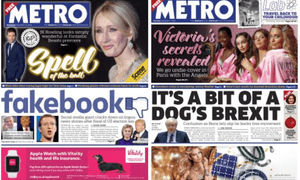Rodney King and the four police officers, the footage sparked the LA riots which caused over billion dollars worth of damage.
The Indian ocean tsunami was largely filmed by citizen journalists/accidental journalists.
The London 7/7 bombings
Mumbai bombings
Hudson river plane crash
- theory (audience reception etc.)
Audience effects theories- Hypodermic needle model, Audiences are being fed mediated news stories it could make it hard for them to differentiate it from reality
User Generated content (UGC)- Audiences can now create there own content and share it to make something original or contribute towards something
Saving money on full time staff
providing a more realistic service for its viewers - using UGC
May have an unmediated News source for them
audience empowerment
Representations of Police in the media
How mediated the news is and how this effects audiences
Social -
Historical-
Economical-
Political-
3) What is meant by the term ‘citizen journalist’?
A citizen journalist or accidental journalist is seen as an ordinary person who captures events a they are happening through the use of technology, for example smart phones or cameras. The events they capture are supposedly real and uncut and not mediated.
4) What was one of the first examples of news being generated by ‘ordinary people’?
One of the first cases was in America where a local resident happened to see something going on outside and decided to film it on his new video camera, this was filmed in the early 90's so modern technology like phones weren't really around then. What this person filmed was the police unlawfully beating a man who had taken them on a car chase across LA. Even though what he did was wrong the Police for one of the first times had been seen to exert too much of there power on a defenseless person.
5) List some of the formats for participation that are now offered by news organisations.
Comment sections
6) What is one of the main differences between professionally shot footage and that taken first-hand (UGC)?
Professionally shot footage is usually staged and planned, so a date is set and a camera crew is gathered and a script is wrote, whilst footage taken first hand is almost completely spontaneous and some may say it isn't as greater quality as professionals as it is not always filmed by experts. But some do prefer first hand footage as it appears more real.
7) What is a gatekeeper?
A Gatekeeper is someone who controls access to something or somewhere. In terms of the news a Gatekeeper would be someone who selects stories sent in from people based on its organisations criteria and values,
8) How has the role of a gatekeeper changed?
We get an example from the Article to show how this has changed and this is from an editor of a news site who said they have to go through hundreds on pictures of kittens. There is also a way around gate keeping now as audiences who now have the means to publish what they like on blogs and forums (because of NDM) don't have to be told what they can and can't post, to a certain extent.
9) What is one of the primary concerns held by journalists over the rise of UGC?
UGC are threatening journalists jobs, as people are seeing UGC as a better representation of whats happening in the real world although some may see the UGC as un-trustworthy because it doesn't come from a large news organisation but some see it as the opposite.
10) Offer your own opinion (critical autonomy) on the following:
What impact is new/digital media having on:
Possibly the amount of news stories we see may increase, especially online as UGC may take over and be most of the main content and because of this peoples proffesional jobs may be in danger as there is no need for them go out and investigate the news when people are already doing it for free.
- the news agenda (the choice of stories that make up the news)
There maybe an increase in choice as people from different parts of the country and world will be able to give their own opinion on an event and there are more people in the world with access to the technology which allows them to capture news worthy events.
- the role of professionals in news
Certainly the number of roles will be in danger as there is no need for an excessive amount of journalists and news organisations won't need as many camera personnel or reporters because they can just as easily get people to send in there own content for free, even if the quality is poorer, people may trust it more.
 For the first time in ages we see some potentially 'positive' news coming from the circulation of Newspapers. The metro has risen in circulation and has passed the daily mail and is now catching the Sun.
For the first time in ages we see some potentially 'positive' news coming from the circulation of Newspapers. The metro has risen in circulation and has passed the daily mail and is now catching the Sun.